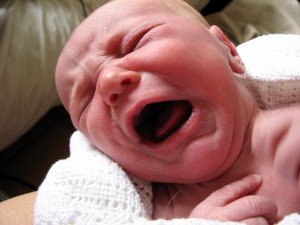
I had a 10-hour migraine yesterday. It was terrible (obviously). So I found it rather morosely coincidental when halfway through the day, as I lay on the couch feeling sorry for myself, I checked my email and noticed this press release from the University of California, San Francisco: "Babies' Colic Linked to Mothers' Migraines."
Colic is excessive crying in a baby that isn't caused by a medical problem. My mother used to get migraines, and I was a colicky baby. I definitely get migraines, so if I have a baby, will she have colic? According to the results of the UCSF study, I'm about two-and-a-half times more likely to have a baby with colic than a woman who doesn't suffer from migraines. Great. Starting a family one day suddenly seems even more daunting.
"I hope no one will alter their family-planning based on these study results," laughed lead author and UCSF child neurologist Amy Gelfand over the phone in response to my colicky baby concerns. "Remember that colic is a time-limited phenomenon, babies do grow out of it by three months of age, typically. And if they do go on to develop migraines later in life, we do have effective treatments to help."
That's comforting. But why is there a link between colicky babies and migraines?
Gelfand said doctors still don't know what makes colicky babies cry so much, but UCSF researchers do have a theory: adults with migraines have genetic mutations in their brains which make them more sensitive to their environment. That same mutation in babies may increase the risk of them being born with colic.